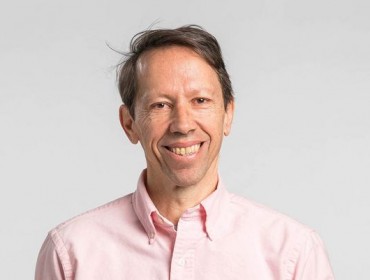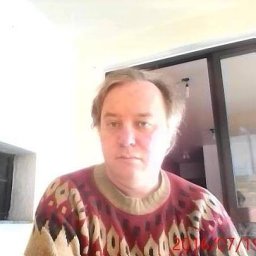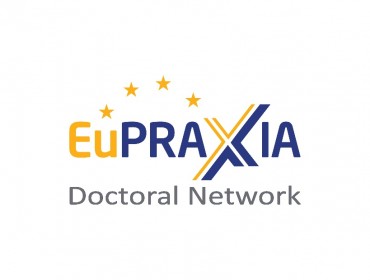-
"Creation and direct laser acceleration of positrons in a single stage” now out on PRAB
Read moreThe work “Creation and direct laser acceleration of positrons in a single stage” by EPP members Martinez B, Barbosa B, and Vranic M. is now out in the journal Physical Review Accelerators and Beams. In this paper, they propose a new setup to obtain relativistic positron beams using next-generation laser systems.
Positrons are created and accelerated during the interaction of an intense laser pulse (80 PW, and 12 kJ of energy) with a relativistic electron beam at 90 degrees of incidence, as seen in the Figure. In this work, it is proven that direct laser acceleration is responsible for the energy enhancement of the positrons.
January 30, 2023 -
Next GoLP VIP Seminar by Patric Muggli
Read moreOn Thursday, 16th of February at 11:30 am, there will be a GoLP VIP Seminar by Patric Muggli (Max Planck Insitute for Physics, Munich, Germany). The event will take place at Anfiteatro Abreu Faro – Complexo I at IST.
Title: AWAKE: a platform for plasma wakefield acceleration and beam/plasma interaction experiments
Abstract: The main ambition of AWAKE in…
January 30, 2023 -
A (micro) star on earth by Luis OS in Publico
Read moreIn a new article in the newspaper Publico, Luis OS (GoLP/IPFN) writes about what to expect from nuclear fusion in the near future and what role can Técnico researchers play in this process.
(translated) «But now everything will be easier because we are aware of what is the final goal (and that is possible to reach it). I dare to expect (and bet!) that, in the next two years, further improvements will be achieved now from the side of nuclear fusion from magnetic confinement, with the demonstration of an energy gain bigger than one (bigger energy produced than the one injected)»
full article at: bit.ly/3w8l64G
January 16, 2023 -
Machine learning application in PIC codes published on Journal of Plasma Physics
Read moreThe work “Machine-learning-based models in particle-in-cell codes for advanced physics modules” by EPP members Chiara B, Pablo J. B., Fábio C, and Luis OS is now out on Journal of Plasma Physics. This paper proposes a new method to use ML-based models in state-of-the-art plasma codes. ML models can be used in these codes to speed up or replace costly sub-algorithms typically used in advanced physics modules.
To showcase the method, the calculation of the probability of interaction between particles via collisions has been replaced, leading to an increase in computational performance without significant physics deterioration (see the plot shared here) from the classical algorithm.
December 14, 2022 -
Next GoLP VIP Seminar by Prof. E. Paulo Alves
Read moreOn Wednesday, 21st of December at 2:30 am, there will be our next GoLP VIP Seminar by Prof. E. Paulo Alves (University of California, Los Angeles). The event will take place at Anfiteatro Abreu Faro – Complexo I at IST.
Title: Accelerating our understanding of complex nonlinear plasma dynamics using machine learning
Abstract: The increasing quantity and quality of plasma data being produced by laboratory experiments, spacecraft observations and high-fidelity numerical simulations is creating new opportunities for innovation in the way we do plasma physics. In particular, deep learning techniques are offering powerful new ways of building highly predictive data-driven models for various important applications (including disruption prediction of fusion plasmas). The inherent complexity of these data-driven models, however, limits their interpretability, challenging the development of a theoretical understanding of the plasma physics underlying the data. In this talk, I will focus on how sparse regression techniques can be used to infer interpretable plasma physics models…
December 12, 2022 -
epp team members attend the Conference on High Intensity Laser and attosecond science (CHILI2022, Tel Aviv)
Read moreEPP members (in the first picture) Petr V, Camilla W, Thales S, and Luis OS went to Tel-Aviv (Israel) to attend the Conference on High Intensity Laser and attosecond science, held on 5th-7th of December 2022. Luis OS and Camilla W presented a talk about their recent work, and Thales S and Petr V presented a poster.
December 12, 2022 -
epp member Bertrand M attend 20th international congress on plasma physics, Korea
Read moreBertrand M went to Hico, Gyeongju (Korea) to attend the 20th International Congress on Plasma Physics, held from the 27th of November to the 2nd of December, and presented a talk about his recent work.
December 6, 2022 -
epp team member Jorge V receives ULisboa/CGD scientific prize
Read moreJorge V was awarded with the ULisboa/CGD Scientific Prize (Physics and Materials category) on November 28th. The scientific prize was institutionalized by the University of Lisbon in collaboration with Caixa Geral de Depósitos, and they distinguish scientific research activities as an incentive to publish in high impact international scientific journals.
December 2, 2022 -
EPP team members attend 20th Advanced Accelerator Concepts Workshop (AAC’22)
Read moreEPP members Bernardo M and Miguel P went to Hyatt Regency Long Island, Hauppauge (NY) to attend 20th Advanced Accelerator Concepts Workshop (AAC’22), held on 6-11 November 2022, and presented a talk about their recent work.
November 21, 2022 -
GoLP PhD students at IST PhD open Days 2022
Read moreFor the last two days, the PhD students of GoLP have been participating in the IST PhD Open Days 2022. During the event, all the students presented a poster summarizing their PhD work, and Óscar A and Filipe C joined the pitch competition as well. This annual event represents an occasion for them to interact and discuss with IST students from different fields and to attend workshops on different topics.
November 15, 2022 -
GoLP at Falling Walls Science Summit 2022
Read moreYesterday 8th of November, our EPP member Marija V hosted a roundtable “new particle accelerators: on a nanophotonic chip?” with Peter Hommelhoff.
November 9, 2022 -
GoLP featured in the most recent LaserLab newsletter
Read moreThe most recent LaserLab newsletter is out. The newsletter is devoted to regularly presenting a set of articles dedicated to a hot topic where the laser contribution is invaluable. This issue is focused on the laser-driven exploration of the Universe.
This newsletter includes a feature on how lasers are exceptional tools to explore phenomena occurring in space, by EPP members Luis OS, Fábio C, and Thomas G, and the news of the ERC grant won by the GoLP alumni Frederico F. Also, the cover has been produced by our EPP member Thomas G.
The newsletter is available here >>.
November 3, 2022 -
EPP team members attend 64th Annual Meeting of the APS Division of Plasma Physics
Read moreSome of our EPP team members went to Spokane, Washington to attend the 64th Annual Meeting of the APS Division of Plasma Physics, held on 17-21 October 2022, and presented a talk about their recent work.
In the picture: Dominika Mašlárová, Róbert Babjak, Bertrand Martinez, Thomas Grismayer, Pablo J. BilBao, Kevin Schoeffler and Rui Torres.Here, some pictures from the event:
October 25, 2022 -
EPP team members receive 71 million core hours at LUMI supercomputer
Read moreEuroHPC awarded 71 million core hours to the epp team to investigate compact plasma accelerators and light sources. A 37 million core-hours allocation on the LUMI supercomputer (Finland) was awarded to Jorge V. (co-PI Thales S.) to explore extreme acceleration and radiation in plasma accelerators. A 34 million core-hours allocation was awarded to Marija V. (co-PI Bertrand M.) for the project PARIS: Particle Acceleration and Radiation with Intense laser Systems.
October 19, 2022 -
October GoLP VIP Seminar by Fernando Haas
Read moreOn Friday, 14th of October at 11:00 am, we had our October GoLP VIP Seminar, by Fernando Haas (Federal University of Rio Grande do Sul). The event took place at Anfiteatro Abreu Faro – Complexo I at IST.
Title: Foundations of Quantum Magnetohydrodynamics
Abstract: The suitable density and temperature ranges where quantum effects are relevant for plasmas are reviewed. Typically such quantum plasmas are characterized by large densities and low temperatures, with a significant overlap of the wave packets of the charge carriers. In this case, the wave nature of electrons, which generally have a much smaller mass than ions, becomes unavoidable deserving a quantum description. Examples arise in compact stars such as white dwarfs and neutron stars, in ultra-small electronic devices and in intense laser-solid density plasma interaction experiments. strong from quantum kinetic theory, we discuss the foundations and the need for quantum hydrodynamic models for the nonlinear treatment of quantum plasmas. In this context, the…
October 17, 2022 -
IST Distinguished Lecture by Sergei Bulanov
Read moreOn Friday, 10th of November at 11:30 am, there will be an IST Distinguished Lecture by Sergei Bulanov (FZU – Institute of Physics of the Czech Academy of Sciences). The event will take place at Anfiteatro Abreu Faro – Complexo I at IST.
Title: Extreme Light–Matter Interaction through the Lenses of the Relativistic Flying Mirror Concept
Abstract: In his seminal paper published in 1905, A. Einstein used an example of the light reflection from the mirror moving with arbitrarily large velocity to illustrate basic principles of special theory of relativity. Nowadays the electromagnetic field intensification and the frequency upshift during the light reflection from the relativistic mirror are attractive for research on the development of sources of high-brightness radiation with tunable parameters required by various applications ranging from relatively moderate radiation intensity and ending with those devoted to quantum field theory. In this regard emerges a question on whether or not it is possible to prepare…
October 13, 2022 -
EPP team member Óscar A attended ICUIL IBS Conference on Ultrahigh Intensity Lasers 2022 (South Korea)
Read moreEPP team member Óscar Amaro went to Jeju Island in South Korea to attend the 2022 edition of the ICUIL IBS Conference on Ultrahigh Intensity Lasers, held on 18-23 September 2022, and deliver a talk. The work presented there consisted in recent developments of a simplified approach to theoretical modelling of electron-laser scattering experiments. The conference included, among other topics, progress in the commissioning of several high intensity laser facilities, some of which will begin user calls soon and run experiments to test strong field quantum electrodynamics.
More information about the conference here.
October 1, 2022 -
EPP team members attend EuroNNAc Special Topics Workshop
Read moreEPP team members Chiara Badiali, Bertrand Martinez and Mariana Moreira (all in the picture above) went to Isola d’Elba in Italy to attend the 2022 edition of the EuroNNAc Special Topics Workshop, held on 18-24 September 2022.
Bertrand M and Mariana M delivered talks, whereas Chiara B presented a poster about their recent work.
September 26, 2022 -
Open positions in the EuPRAXIA Doctoral Network
Read moreHigh level fellowships will carry out an interdisciplinary and cross-sector plasma accelerator research and training program for the new EuPRAXIA research infrastructure.
The EuPRAXIA Doctoral Network (EuPRAXIA-DN) is a new Marie Skłodowska-Curie Actions Doctoral Network (MSCA-DN) offering 12 high-level fellowships between universities, research centres and industry that will carry out an interdisciplinary and cross-sector plasma accelerator research and training program. The network will start on 1 January 2023 and benefit from more than 3.2 M€ of funding over its 4-year duration.
Several tens of thousands of particle accelerators are in use today with varied applications in research, industry, medicine and other fields. Yet accelerator usage could be much more widespread, were it not limited by cost and size constraints, especially in hospitals, universities, and small and medium size companies. This would enable ground-breaking applications and innovations on a much larger scale.
A possible solution to this bottleneck is the development of…
September 21, 2022 -
Marija Vranic Wins the 2022 IUPAP award for plasma physics
Read moreThe EPP member Marija Vranic, is the winner of the 2022 International Union of Pure and Applied Physics (IUPAP) Early Career Award for the Comission on Plasma Physics. The recognition is awarded for her contributions on the understanding of the interplay between classical and quantum effects in extreme ultra-intense laser-plasma interactions, on the underlying computational methods, and on the applications for plasma-based secondary sources of energetic particles. This is the first time an IUPAP prize is given to someone working in Portugal.
July 12, 2022
Group for Lasers and Plasmas > News




























